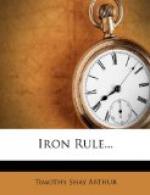Erroneous judgment of others is almost certain to mark the conclusions of such a man’s mind; and it is no wonder that Mr. Howland erred in his conclusions respecting the true character of his daughter’s husband, who had in him many good qualities, and was sincerely attached to Mary. The great defect appertaining to him, was the fact that he was not a church member. Mr. Howland did not look past the veil of a profession, to see if there was in the ground work of the young man’s character a basis of right principles—the only true foundation upon which a religious structure can be built. Because he did not belong to the church, and make an open profession, he classed him with the irreligious, and considered him as one whose feet were moving swiftly along the road to destruction.
And so, instead of wisely seeking to win the confidence of the young man, that he might gain an influence over him for good, Mr. Howland, offended because his daughter could not obey him in a matter so vital to her happiness, angrily repulsed and insulted both of them, even after he saw that a marriage was inevitable. The consequence was, as has been mentioned, that Markland, who possessed an independent spirit, would not go to the house of his father-in-law; and Mary, resenting the wanton attacks that had been made upon her husband’s feelings in more than one or two instances, absented herself also. Mr. Howland, however much he might regret the hardness of his unavailing opposition, was not the man to yield anything; and so the breach remained open, in spite of all the grieving mother’s efforts to heal it.
Of all his children, Mr. Howland saw most to hope for in Edward, who early perceived it to be his best policy to humor his father, and, by that means, gain the ends he had in view. Cold in his temperament, he was generally able to control himself in a way to deceive his father as to the real motives that were in his heart. Thus, while Mr. Howland, by his peculiar treatment of his children, drove some of them off, he made this one a hypocrite.
Not the smallest affection existed between Edward and the other children, who knew too well the selfish and evil qualities that lay concealed beneath an external of propriety, put on especially for his father’s eyes. The mother, too, saw beneath the false exterior assumed by her son, who treated her, except when his father was present, with little respect or affection.




